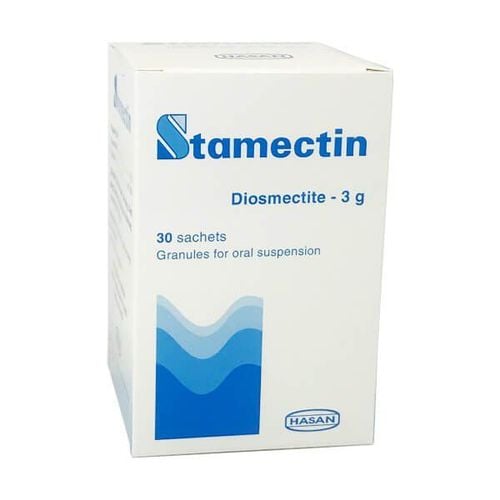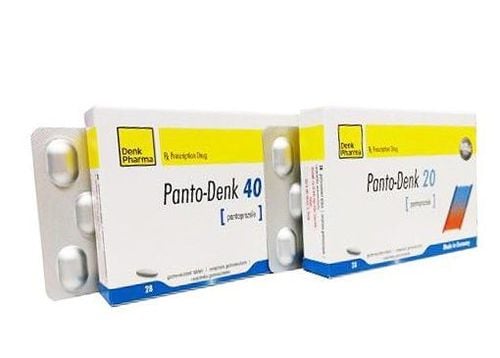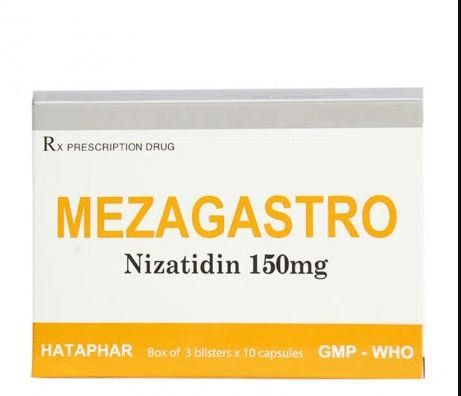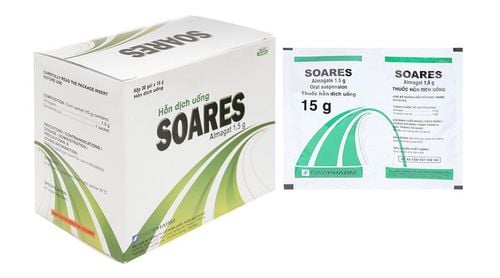This is an automatically translated article.
Zantac stomach medicine contains the active ingredient ranitidine, which is a drug that helps reduce acid secretion in the stomach thanks to a competitive mechanism of action with histamine. Zantac 150 is often indicated for use in the treatment of duodenal ulcers, benign gastric ulcers, postoperative ulcers and conditions requiring a reduction in gastric secretion and acid secretion.1. What is Zantac?
Zantac stomach medicine contains the active ingredient ranitidine 150mg, which is an H2 antihistamine packaged in the form of tablets and effervescent tablets. The use of Zantac 150mg is to block the effects of histamine in the stomach and help reduce the amount of acid in the stomach or the symptoms of heartburn, heartburn and indigestion. Zantac 150 is used to treat and prevent heartburn, indigestion and heartburn caused by certain foods and drinks.With the active ingredient ranitidine, Zanatic gastric medicine is indicated for use in adolescents from 12 years of age and older and adults in some cases such as:
Duodenal ulcer - benign stomach, including ulcers caused by the use of non-steroidal anti-inflammatory drugs; Prevention of duodenal ulcers caused by non-steroidal anti-inflammatory drugs (NSAIDs) including aspirin, especially in patients with a history of peptic ulcers; Duodenal ulcer caused by a patient infected with Helicobacter pylori; Ulcers after surgery; Reflux esophagitis ; Alleviate the symptoms of gastroesophageal reflux - oesophagitis; Zollinger - Ellison syndrome ; Chronic episodic dyspepsia and presenting as pain (epigastric or retrosternal) related to meals or sleep disturbances unrelated to the above medical conditions; Prevention of peptic ulcers caused by stress in seriously ill people; Prevention of recurrent bleeding from peptic ulcers; Prevention of Mendelson's syndrome; Short-term treatment of peptic ulcers in children aged 8-11 years; Treats gastroesophageal reflux disease, including reflux esophagitis, and helps relieve symptoms of gastroesophageal reflux disease in children 8-11 years of age.
2. Instructions on how to use Zantac
2.1. How to use Take the drug orally. May be taken with food to reduce the risk of stomach irritation. Note that the medicine can be chewed with a sufficient amount of water.
2.2. Dosage Reference Adults (including the elderly): Reference dose 150mg in the morning and 150mg in the evening or 300mg at bedtime. Children ≥ 12 years old: Children > 30kg and between the ages of 3-11, the dose is calculated based on the weight index. Consult your doctor for a specific dose. Peptic ulcer - duodenal (small intestine): The usual dose is 2mg/kg x 2 times/day x 4 weeks. The dose may be increased to a maximum of 4 mg/kg twice daily. Each dose is spaced 12 hours apart and treatment can be up to 8 weeks. Heartburn due to too much acid: The usual dose is 2.5 mg/kg body weight x 2 times/day x 2 weeks. The maximum dose that can be increased is 5mg/kg twice daily.
3. Side effects of the drug Zantac
During the use of Zantac stomach medicine, patients may experience some manifestations of unwanted side effects such as:
Pancreatitis; Diarrhea ; Increased liver enzymes; Erythema multiforme; Eye accommodation disorder; Itching, pain at the injection site; Hepatitis , sometimes with jaundice; Headache, dizziness, weakness; Leukopenia, thrombocytopenia; Presence of gynecomastia in male patients; Agranulocytosis or pancytopenia including bone marrow hypoplasia; Hypersensitivity reactions such as urticaria, bronchospasm, fever, anaphylaxis, angioedema, myalgia and arthralgia have occurred. Note: The above is not a complete list of symptoms of Zantac 150 drug side effects. If the patient develops any unusual symptoms that are suspected to be due to the use of the drug, immediately notify the doctor or pharmacist.
4. Notes when using Zantac
Use with caution and reduce dose in patients with renal impairment; Use with caution in patients with hepatic impairment because the drug is metabolised in the liver; Long-term treatment with Zantac stomach medicine can cause vitamin B12 deficiency; Avoid using the drug in patients with a history of acute porphyria; In the elderly and in patients with renal failure, discontinue treatment with Zantac 150 in the event of a state of confusion; When peptic ulcer is present, the possibility of cancer must be ruled out before initiating treatment because histamine H2-receptor antagonists may mask the symptoms of gastric cancer. Thus, making the diagnosis of the disease become slower; Ranitidine in the drug is excreted in breast milk. Therefore, extreme caution should be exercised when administered to women during lactation. Consult your doctor and weigh the risks and benefits of the drug before deciding to use it.
5. Zantac drug interactions
In some cases, Zantac may interact with the following products:
Alcohol; Saquinavir; Cigarette; Drugs Ketoconazole, Itraconazole; Drugs Atazanavir, Cefpodoxime; Iron salts; Cefuroxime, Indinavir, Fosamprenavir, Mesalamin and Nelfinavir.
Please dial HOTLINE for more information or register for an appointment HERE. Download MyVinmec app to make appointments faster and to manage your bookings easily.













